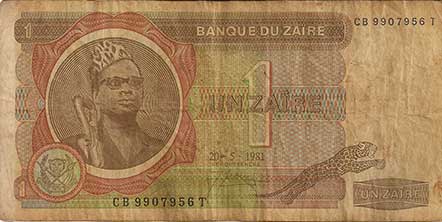 Money
Money
Changing money is obviously one of the first things to be done upon entering a new country. Fortunately, in Europe, almost every bank will change currency. In Alaska, we could only do it at one branch of one bank.
Africa is different. For most countries, we had to declare all of our currency when we went in, have all exchanges officially stamped on the declaration form, and get everything checked when we left to make sure it balanced. This is the government's way of combating the black market. It wasn't really as tough as that, because the border officials were pretty lax, but if they'd been strict, they could have enforced jail terms.
Algeria requires everyone who enters to exchange 1000 dinars (about $225) at the official exchange rate, which is highly inflated. The trouble was, they wouldn't take Dennis' British 50-pound notes. No reason, they just refused. Smaller pound notes or dollars were acceptable, neither of which we had. We eventually found a bank willing to exchange them.
We had the bad luck of entering nearly every African country on a weekend or holiday. Most of us kept some cash hidden from the authorities for trading on the black market. People would find us and offer to exchange on the black market as soon as we pulled into a city.
Getting money changed legally, however, was tough. The banks were open only a few hours a day. In Kano, Nigeria, we went to several banks and each of them sent us somewhere else. At last, we found a likely prospect. Exchange rates were posted conspicuously. A man checked with someone in a back office and then motioned us in. Finally, we thought, success.
But the man in the back room said no, they wouldn't exchange our money. In frustration, I said, "We've been to bank after bank and no one will change our money. Can you tell us where we can get it exchanged?"
"I'd suggest the black market," said the official.
We tried again in Jos, Nigeria. We had to have at least one stamp on our form to prove we'd exchanged money legally.
The first bank we tried had an exchange department, which was upstairs and down several halls. We waited for nearly an hour while the man dealt with two people ahead of us in line. Then he looked carefully at our 20-pound note, seemingly searching for something wrong with it. He did.
"This money is too old," he said.
"Too old?" That was a new idea to us. It was dated nineteen seventy-something.
"I cannot exchange it for you." He went back to his work and studiously ignored our protests.
We learned later that under the current Nigerian government, "old" money had been simply declared invalid. People's savings were wiped out and they had to start all over with nothing. A naira note of that age would have been "too old". Shortly before we left the country, we managed to exchange a little money, but there was little time left to spend it.
In Zaire, the men at the banks checked each note meticulously. Notes had to be brand new and crisp, and have absolutely no writing on them. No small tears or tattered edges.
The bills in Zaire, by contrast, were atrocious. There were no coins. A one-zaire note was worth three-fourths of a penny. We had to carry handfuls of money—much of it tattered and grimy almost beyond recognition. It was a sort of game among the locals to see how many times they could pass off money before someone refused to take it. Tourists were good targets; we had trouble spending some of our notes. Once Dennis was given a 50-zaire note in change when he bought a Coke. The very next day at the very same establishment, the very same man refused to accept the very same note.
When we entered Tanzania, Dennis hid some Kenyan shillings and American dollars, against my wishes. I prefer to be straightforward and legal on such things. We crossed the border and asked where we could find a bank.
"No bank here," said a well-dressed young man.
"We need to exchange money," Dennis said.
"The next town is about 30 kilometers down the road. They have a bank," he said. "I am planning to go there. A truck will be here soon to pick me up and you can come as well."
"Is there a charge?" asked Dennis.
"Yes. It costs 50 Tanzanian shillings."
"But we have no Tanzanian money," I said.
"Do you have Kenyan money?" he asked. "I can change it for you—black market."
We looked at each other and then back toward the immigration office, where we'd just told the officer we had no Kenyan money. It didn't seem safe.
"No," said Dennis.
"Do you have any dollars or other money you haven't declared?" he asked.
"Well," said Dennis reluctantly. "I have a few shillings."
"Good," he said. "Come right in."
The exchange was made. As we waited for the truck, the young man, friendly and well-educated, asked us the usual questions, about our home, travel, work.
"We're teachers," I told him. "What do you do?"
"Oh," he answered nonchalantly. "I'm an immigration officer."
Go on to Mbula, Zaire's "Ghost City"
Source: www.SusanCAnthony.com, ©Susan C. Anthony
